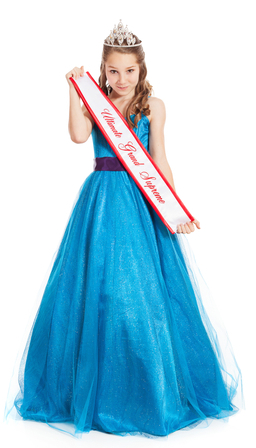I’ve got nothing against the new Ms. Virginia, Bekah Pence. I just want to get that out of the way here at the beginning, because criticizing the sincerity of a fellow Latter-day Saint is not my intent. A returned missionary with a strong faith, Pence sounds like a lovely person inside and out.
But making modesty a “platform” in a beauty contest, as Ms. Pence did on Sunday, is about six different flavors of ironic.
The Deseret News reported:
The most important message Bekah Pence hoped to convey was that young women can be modest and still look glamorous.
“I’m a firm believer in not just being modest, but you can also be absolutely drop-dead gorgeous, not just beautiful,” she said. “I feel like girls don’t feel that way. They think that it’s a step down if you’re modest. They don’t think you can be absolutely gorgeous, but I felt that way. I felt like, ‘You know what? This dress is amazing, and I feel gorgeous in it — and I’m modest.”
Drop-dead gorgeous, glamorous, beyond beautiful. Really? Has our definition of “modesty” become so impoverished that we buy into every consumer message of the surrounding culture with the single exception of the one that says women have to show shoulders and cleavage?
This is not modesty. It’s never inherently “modest” to parade a body in front of a consuming audience, making that body and its clothing a prime focus of our attention. According to the pageant’s website, 25% of the judging is based on how a woman looks in a swimsuit, and another 25% on how she appears in an evening gown.
Whether the swimsuit is a one-piece or a bikini is not as important as the underlying issue that women are being judged for how they look and how they set themselves above other people in the public square — neither of which is the definition of modesty.
Recall that Pence said that modest clothing does not have to represent a “step down” in beauty and attractiveness. The message there is that a woman does not have to bare her breasts to be the most dazzling person in the room, the one everyone stops to stare at because of how she looks.
Looking good is not wrong, and neither is success. And I applaud women and men who stand up for their values in public. But that’s not the same as modesty, and Mormons need to stop using the word inappropriately. For an example of how very confused our modesty rhetoric has become, consider this snippet from yesterday’s tagline in LDS Living‘s coverage of the pageant win:
 Ahem. Drawing “a lot of attention” to oneself, by whatever means, is not the point of modesty.
Ahem. Drawing “a lot of attention” to oneself, by whatever means, is not the point of modesty.
For an excellent, thoughtful, and positive exploration of modesty in the scriptures, check out Samantha Shelley’s blog post from last week. (And lest you think I am unfairly picking on LDS Living with the above screen shot, note that this wonderful post came from the same site.) Shelley writes:
If you search “modesty” on LDS.org, part of the given definition says, “If we are modest, we do not draw undue attention to ourselves.”
I’ve come to understand that “undue attention” refers to far more than simply a lot of skin showing. If we are using the clothes we wear to get attention, we are not being modest.
When you look good, you feel good—there’s nothing wrong with that. We should be “neat and comely” like the righteous people in Alma. But if our confidence comes from the way we look, we probably need to reassess what we value the most. Said Elder Glenn L. Pace of the Seventy, “The Lord endows us with confidence as we practice ’charity towards all men’ and have righteous thoughts.”
I’ve no doubt that Bekah Pence is a charitable person who has righteous thoughts. But saying that the design of women’s clothing is “the most important message” she could convey with her platform is a missed opportunity for real charity, at best.
Maybe we need to separate the good word “modesty” from all this single-minded focus on appearance. It would help if we reserved “modesty” for what it actually means — not drawing attention to ourselves or regarding ourselves as superior to others — and used another word for our various judgments about skirt hems or the state of our sleeves. We could call that “discreet coverage,” or “chaste clothing,” or — my favorite — “vestal vestments.”
Anything but what we do now.






